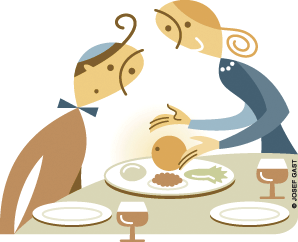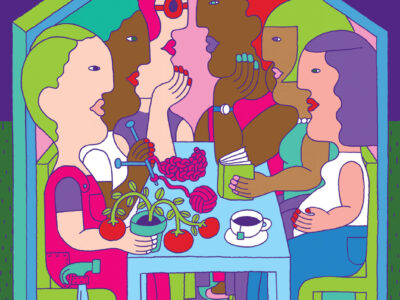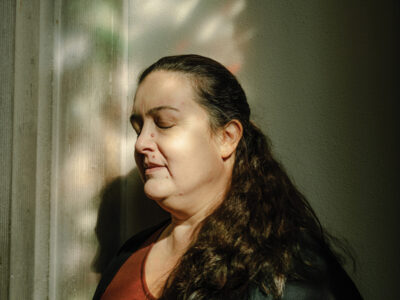
Class of ’89 | Susannah Heschel Gr’89 may be best known for a story that both is and is not hers.
After researching the marginalized roles of women, gays, and lesbians, Heschel decided, one Passover seder, to place an orange on her family’s seder plate.
“I chose an orange because it suggests the fruitfulness for all Jews when lesbians and gay men are contributing and active members of Jewish life,” Heschel wrote in an essay about the choice. “I also saw the orange as representing the fruitfulness that results when women lead the seder.
“Thus, while I originally placed an orange on my family seder plate for a combination of reasons related to women’s marginality in Judaism,” she explained, “when we ate the orange, I sent a message that was loud and clear: We were doing so to express our solidarity with gay and lesbian Jews. To speak of slavery and long for liberation demands that we acknowledge our own complicity in enslaving others.”
Heschel would mention her decision to place the orange on the seder plate in lectures—and was soon approached by strangers who told her that they were placing oranges on their seder plate because they had heard a story about her.
“The story went that, after a lecture I delivered in Miami Beach, a man stood up and angrily denounced feminism, saying that a woman no more belongs on the bimah [pulpit] than an orange belongs on the seder plate,” Heschel wrote. “After hearing this tale dozens of times, all over the country, I realized my story had fallen victim to a kind of folktale process in which my custom was affirmed, but my original intention was subverted. My idea—a woman’s words—were attributed to a man, and my goal of affirming lesbians and gay men was erased.”
Heschel has spent her entire professional life writing about feminist perspectives within the context of a larger patriarchal framework. Her own father, Abraham Joshua Heschel, was a celebrated Jewish theologian, rabbi, and philosopher whose legacy of social activism inspires her to this day. Her own professional achievements are currently being celebrated by her inclusion in an on-line exhibit of the Jewish Women’s Archive at www.jwa.org: “Jewish Women and the Feminist Revolution.”
Heschel published the book On Being a Jewish Feminist in 1983 while she was a graduate student, and when the words Jewish and feminist were seldom uttered in the same breath. Her contributions to the archive include a letter thanking her for her talk on Judaism and feminism in 1984, and a letter from a Clark University undergraduate thanking her for her talk there in 1983.
Her biographical profile on the site tells of how the early 1980s were a watershed moment for many Jewish women, who took up the mantle of feminism upon reading Heschel’s book.
“I was invited (and sometimes disinvited) to speak at Jewish book fairs and community gatherings, where the audiences lagged far behind the consciousness of feminist Jews,” Heschel wrote in the Jewish Women’s Archive website. “My talks became less information-based lectures than consciousness-raising sessions.”
With the publication of her book, she noted, “I began to experience an emotional change as a feminist: my rage turned to laughter at the absurdity of sexism and its defenders, and I felt energized by the constructive efforts of those working for change.”
“A lot of things made me quite angry about the way women were treated in the Jewish community, and I found them very hurtful,” Heschel says now, citing issues related to the ordination of women rabbis as an example. “But after writing about it, talking to other women, and so on, I was able to laugh, because it all seemed so ridiculous—and the laughter itself was a kind of empowerment that was important.”
Heschel doesn’t see much to laugh about, however, when it comes to the political climate towards feminism.
“There are still very patronizing attitudes” within the Jewish community, she says. “Women can be ordained as rabbis, but nonetheless have to face congregants who speak down to them. There isn’t a lot of solidarity.” Beyond that, a “very disturbing” and “reactionary” trend has recently emerged throughout American culture, she believes.
To see passivity in the context of feminist issues, one need only look at American college campuses, Heschel suggests. “I think that undergraduate women have not experienced the same kinds of inequities that I experienced. Their mothers have had an easier time than my mother. So in that sense, their approach to life is quite different.
“It’s usually in the years after college that things get especially difficult—when they have to get a job, when they look for a spouse—that’s when they start to experience some pretty bad things.”
While “a lot of the feminist movement was focused on institutional inequities, and turned to legal structures for remedy,” she notes, it “didn’t address hostile attitudes and misogyny. If anything, there’s been a rise in resentment.
“Those are the kinds of problems that are intransigent,” she warns. “They’re going to be with us for a very long time. They’re problems of attitude, and they’re much more difficult to overcome than problems of structural or legal inequity.”
—Jordana Horn C’95 L’00




